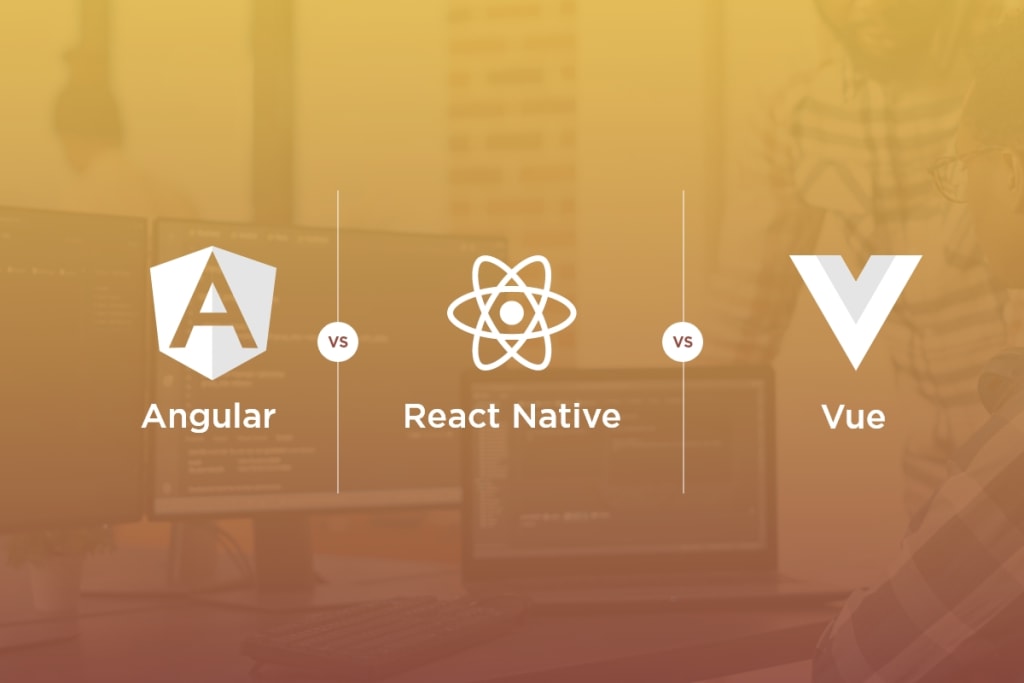Angular vs React vs Vue | Which is a Better Framework?
Developers were arguing whether to use Angular or React for their apps. However, a third contender known as Vue.js has also gained popularity. Let's see which is superior.

This guide should be useful if you're a developer who is just starting out on a project and can't decide which JavaScript framework to utilise. Every front-end developer has heard of the three web application frameworks: React, Vue.js and Angular. React is a front-end framework, Angular is a user interface library and Vue.js is a progressive framework.
Let us find out more about these three frameworks.
Introduction
In this section, we'll examine various parts of Angular, Vue and React to determine how they might satisfy your requirements.
Architecture
React:
The smallest components of React apps are React Elements. They are more powerful than DOM elements since the React DOM updates them as soon as something changes. React is based on JavaScript, however, it is primarily used in conjunction with JSX, a syntax extension that allows firms reactjs development services to create elements that contain both HTML and JavaScript.
Vue:
It is referred to as a progressive framework since its functionality may be augmented using official and third-party packages such as Vue Router or Vuex to make it a true framework. You'll largely be working on the ViewModel layer with Vue, ensuring that the application data is processed in such a way that the framework can render an up-to-date View.
Angular:
Modules, Components and Services are the three components of an Angular project. Every Angular application contains at least one root component and one root module. Each Angular component consists of a Template, a Class that defines the application logic, and MetaData.
History
React:
React, created by Facebook, was first launched in 2013. Facebook makes considerable usage of React in its products. The most recent stable version is 17.X, which was released in October 2020.
Vue:
Vue is the group's newest member and is often known as Vue.js. The most recent stable version is 3.0, which was released in September 2020.
Angular:
Angular, created by Google, was the first to be launched in 2010, making it the eldest of the bunch. With the release of Angular 2, a significant shift occurred in 2016. Angular 13, which was published in November 2021, is the most recent stable version.
Popularity
React:
It is one of the most popular JavaScript projects. Facebook created and maintains it and it's utilised in many of its internal projects. According to BuiltWith use statistics, it also powers over 2 million websites.
Vue:
Vue has the most stars on GitHub of the three frameworks, at 176k. Evan You, a former Googler, is the project's creator and leader. It is a highly strong, autonomous project in the open-source community, with over 1 million websites using it.
Angular:
Google created Angular, but it's odd that it's not used in some of their main applications, such as Search or YouTube.
The Job Market: If you are solely concerned with the present job market, your best chance is to study Angular or React. However, considering Vue's popularity during the previous three years, it may take some time for projects that use Vue or new projects that use Vue, to reach a level of maturity that commands a larger number of developers.
Community and Growth: We've already seen that incremental versions for all of the frameworks have been shipped on a regular basis over the last year, indicating that development is in full flow. When comparing Vue to React, Vue has a significantly higher number of viewers, stars and forks. This demonstrates Vue's popularity among consumers as well as its value in comparison to React. on the other hand, Vue has fewer contributors than Angular & React.
One probable explanation is that Vue is totally driven by the open-source community, whereas Angular and React have a large proportion of Google and Facebook personnel contributing to the repositories. According to the statistics, all three projects have significant development activity, which will undoubtedly continue in the future — these numbers alone cannot be used to justify not using either of them.
Migrations: You don't want to have to worry about a framework update breaking your code while you're working with your preferred framework. Though you won't have many troubles switching from one version to the next, it's crucial to have your finger on the pulse because some changes can be more significant and require tweaks to make things compatible.
Angular intends to release major improvements every six months. There is also a six-month grace period before any significant APIs are deprecated, giving you the equivalent of two release cycles to make any necessary adjustments. When it comes to Angular vs React, Facebook has claimed that reliability is of the biggest importance to them, as React is used by large firms such as Twitter and Airbnb. Upgrades via versions are often the simplest with React, with tools like react-code mod assisting you in the process. To know more about React framework, you may contact a reactjs development company.
Dimensions and Loading Times: Because caching and minification are now quite standard, the sizes of the libraries won't be as important. Although the sizes of the frameworks can vary significantly, they are still minimal when compared to the average homepage size. Furthermore, if you use a popular CDN to load these libraries, it is very likely that a user already has the library loaded on their local machine.
Components:
React:
React, curiously, blends component UI and behaviour. For example, here's the code for a React hello world component. In React, the same piece of code is responsible for both constructing and dictating the behaviour of a UI element.
Vue:
When comparing Vue with React, it is worth noting that in Vue, UI and behaviour are both components, making things more intuitive. Also, because Vue is very customisable, you may combine the UI and functionality of components from within a script.
Angular:
Components are referred to as directives in Angular. Directives are just DOM element markers that Angular may track and associate with a specified behaviour. As a result, Angular divides the UI part of components as HTML tag attributes and their behaviours as JavaScript code. When comparing Angular versus React, this is what distinguishes it.
Learning Curve:
React:
React provides a Getting Started guide that should assist in getting React up and running in about an hour. The documentation is extensive and comprehensive, with solutions to typical problems currently available on Stack Overflow. React is not an all-inclusive framework and advanced capabilities necessitate for firms providing reactjs development services to use third-party libraries.
Vue:
Vue is more customisable and thus easier to learn than Angular or React.
Angular:
Because Angular is a comprehensive solution, it has a steep learning curve and understanding it necessitates knowing related topics such as TypeScript and MVC.
Conclusion:
Who will triumph in the Angular vs. React vs. Vue war? You will only be able to answer this question by studying your goals and project specifics. You can experiment with each of them to find the ideal option for your project. In case you choose to go with React then availing services from a reactjs development company will be a great option.
About the Creator
Vikrant Bhalodia
An Avid Writer by nature. Head of HR & People Ops | OD Expert @ WeblineIndia, a leading Software Development Company in USA & India.






Comments
There are no comments for this story
Be the first to respond and start the conversation.